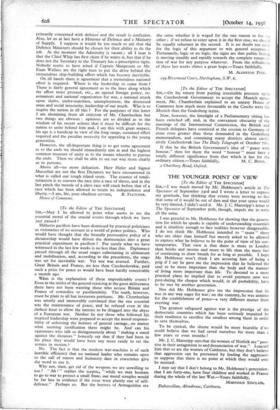THE YOUNGER POINT OF VIEW
[To the Editor of THE SPECTATOR]
SIR,—I was much moved by Mr. Hobhouse's article in The Spectator of September 23rd and I wrote a letter to express my gratitude, but thinking that events were moving so fast that some of it would be out of date and that your space would be very limited, I didn't send it. Mr. J. C. Mantripp's letter in The Spectator of September 3oth, though, impels me to write all the same.
I was grateful to Mr. Hobhouse for showing that the genera- tion for which he speaks is capable of understanding essentials and is idealistic enough to face realities however disagreeable. I do not think Mr. Hobhouse intended to " taunt " those who are older than himself but merely asked to be allowed to express what he believes to be the point of view of his con- temporaries. That view is that there is more to London than bricks and mortar and more to life than the mere fact of continuing to draw breath for as long as possible. I hope Mr. Hobhouse won't think I am accusing him of being a prig if I say he gave me the impression that he believed the soul to be more important than the body and the manner of living more important than life. To descend to a more practical plane he implied that to avoid payment now was post-dating the cheque which would, in all probability, have to be met by another generation.
Nor did Mr. Hobhouse give me the impression that he was in any way eager for war; on the contrary, he was anxious for the establishment of peacea very different matter from averting war.
The greatest safeguard against war is the prestige of the democratic countries which has been seriously impaired by their readiness to sacrifice the smallest among them in order to save themselves.
To be cynical, the shame would be more bearable if we could believe that we had saved ourselves for more than a few years or even months !
Mr. J. C. Mantripp says that the women of Norfolk are "posi- tive in their antagonism to and denunciation of war." I can tell him that so are the women of Caithness, but they don't believe that aggression can be prevented by leading the aggressors to suppose that there is no point at which they would ever be resisted.
I may say that I don't belong to Mr. Hobhouse's generation, that I am forty-one, have four children and worked in France during the whole of the last War.—Yours faithfully,


















































 Previous page
Previous page